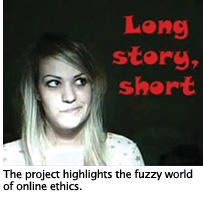This post is a follow-up to an article by Andrew Adam Newman that appeared in Adweek on May 5, 2008 called The True Story of a Bogus Blog, via PRWatch.org
 Report: Hunter College Probe Slams Coach-Sponsored PR Class
Report: Hunter College Probe Slams Coach-Sponsored PR Class
Adweek
by Andrew Adam Newman
May 9, 2008
The course was funded by a $10,000 grant from Coach as part of a college outreach effort by the IACC.
New York: A Hunter College Senate Committee’s investigation of a Coach-sponsored PR class slams the college’s administration on numerous academic freedom grounds and says that the PR practices taught in the class were “deeply troubling.”
As detailed Monday in Adweek, the course taught last spring at Hunter in New York was funded by a $10,000 grant from Coach and was part of a college outreach campaign by the International Anti-Counterfeiting Coalition (IACC), a trade group that includes Coach and other brands like Apple, Levi Strauss & Co., Louis Vuitton and Rolex. A class, acting as an idea-pitching and campaign-executing agency for Coach and the trade group, invented a blogging student named Heidi Cee whose posts on Facebook and MySpace try to dissuade students from buying counterfeit goods. PR observers and bloggers faulted the campaign for being deceptive.
The findings in the below report, which was leaked to Adweek and is scheduled to be presented on May 21 to the full college senate, largely echo the concerns of Stuart Ewen, one of two Hunter professors who made the complaint that led to the investigation, namely that the professor who taught the course was “coerced” to do so, that the trade group’s and Coach’s hands-on involvement with the course “was clearly a violation of academic freedom,” and that that the course was initiated at the behest of the administration rather than the faculty.
Concerning the widely held suspicion that the course appeared to be a way of buttering up Coach CEO Lew Frankfort, a Hunter alumnus, who several months later donated $1 million to the school, the report says it “did not have access to information that could prove or disprove the belief.”
While the report stresses that the nature of the campaign itself is outside of its purview, it still gives it a dig, saying, “The nature of the course allowed for a casual approach to the dignity of students and relied on deception to achieve some of its aims — which were, we emphasize, as much corporate as pedagogical.”
William Sakas, the Hunter professor who chairs the Academic Freedom Committee, stresses that it doesn’t have any legislative power to act on the findings.
“We’ll submit it the Senate Administrative Committee and the Provost’s office,” Sakas says. “They’re the ones that can take action.”
